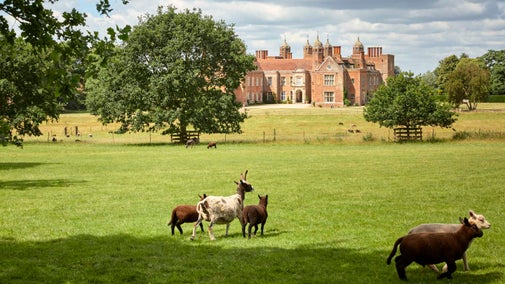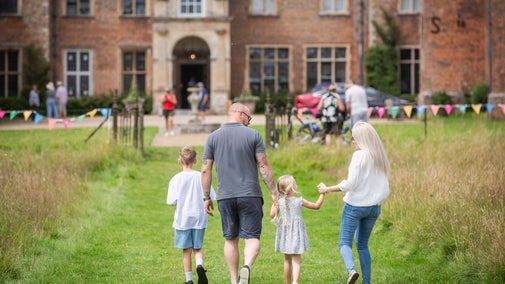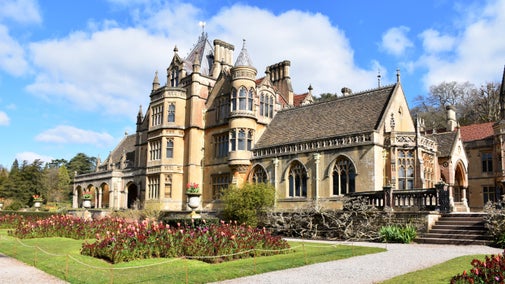
Melford's collections
Explore the objects and works of art we care for at Melford Hall on the National Trust Collections website.

Melford Hall has been home to the Hyde Parker family since 1786, and members of the family still live in the South Wing of the building. As you walk down the drive, you can admire the imposing red-brick building, before stepping inside to discover the grand, wood-panelled Great Hall – not to mention the bedroom where Beatrix Potter stayed. Here’s what to look out for on your visit.
If you interested in finding out more about the history associated with Melford Hall, then why not join us for one of our monthly talks and tours:
Naval talk - Come and join us to hear the seafaring adventures of the Hyde Parker family
There is no extra charge for thisi event, beyond the normal admission charge, and booking is not needed - just time up at the appointed time.
Sir William, the 7th Baronet, commissioned Thomas Hopper to update the Great Hall in the neo-classical style complete with a library. The Cordell Charter on display in the Hall records the grant given by King Philip and Queen Mary to Sir William Cordell in 1554, and is written on vellum using iron-gall ink. As you come back through the Great Hall, you’ll be able to see the large vellum map of the estate painted for Sir William Cordell by Israel Amyce in 1580.
As you enter the Dining Room, you’re transported into a different world. In 1942, when the army was billeted at Melford Hall, the north wing was devastated by fire. Ulla, Lady Hyde Parker, decided that the rebuilding would incorporate her taste for the lighter style of Scandinavia.
The Georgian Blue Drawing Room, refurbished by the Cordell family, is light and airy - very different in style to the dark-panelled Great Hall.
The ‘year-going’ longcase clock found in the corner of the room is the only year-going clock in the Trust, and is a wonderful example of craftsmanship. Made by Richard Street of London in 1700, it’s regarded as one of the most significant clocks in the whole of the National Trust.
The case is covered in exceptionally fine-quality seaweed marquetry. Inside, labels show that the clock was wound and serviced during the 19th century.

Created for Bridget Firebrace, the Boudoir is an opulent space, decorated with large mirrors, gilt furniture and an extravagant crystal chandelier. Boudoirs were private sitting rooms for ladies, where women could relax after formal dinners. Gentlemen would retire to a separate room for after-dinner drinks and cigars.
As you climb the stairs and enter The Gallery, you pass the stained-glass window commemorating the visit of Queen Elizabeth I to Sir William Cordell in 1578. Close by are portraits of Elizabeth Countess Rivers and her husband Sir Thomas Savage who inherited Melford Hall in 1602. Sir Thomas made major changes to the hall, probably to accommodate his 19 children, and is largely responsible for the way the hall looks now.
The Chapel is a more recent addition to the building established by the Reverend Sir William Hyde Parker, the 10th baronet, and contains the ivory statuette of Our Lady of the Immaculate Conception, which was part of the cargo from the captured Santissima Trinidad.
In the West corridor you pass the Nursery with portraits of Sir Richard Hyde Parker and his sister Elizabeth on either side of the window, painted by the Hungarian artist Felix Horta.
A handsome example of Regency design, still preserving the bookcases and furniture that were made especially for it. In the small library is the portrait by George Romney, of Vice-Admiral Sir Hyde Parker I whose son, Sir Harry, the 6th Baronet, purchased Melford Hall. Paintings by Dominic Serres commemorate the actions in the American Civil War in which Admiral Hyde Parker II participated.
Climbing the staircase, you pass two Chinese urns which are part of the booty from the capture of the Spanish galleon, the Santissima Trinidad. From the Boudoir, look back at the staircase and admire the portrait of Captain Sir Hyde Parker who, as an Admiral, commanded the fleet at Copenhagen with Horatio Nelson as his second-in-command.

This bedroom was used by Beatrix Potter on her many visits to stay with her cousin. She often brought a menagerie of small animals, which she kept in the turret room. Look out for the original Jemima Puddle-Duck that she used to illustrate ‘The Tale of Jemima Puddle-Duck’. Many of Potter's drawings inspired by Melford Hall and its contents can be found around the house.
The North Bedroom houses the Italian cabinet – probably bought on a Grand Tour of Europe. It’s a rosewood and ebony structure that would've been used as a secure repository as well as being a highly decorative item. The drawers are decorated with panels of painted glass depicting mythological and biblical scenes.

Explore the objects and works of art we care for at Melford Hall on the National Trust Collections website.

Explore the history of Melford Hall and trace its evolution through the centuries, from its ownership by Benedictine monks to its royal connections and visits by Beatrix Potter.

Explore Melford Hall and enjoy a gentle stroll around the garden or a brisk walk in the park. Then pause on the north lawn to enjoy the views of the wider estate and wildlife.

The tea-room at Melford Hall in Suffolk is the ideal place to treat yourself to a cuppa and a tasty treat before, during or after your visit.

Walks, picnics and discovering Beatrix Potter stories in the house are just some of the things you can do on a family day out at Melford Hall.

Historic buildings are a treasure trove of stories, art and collections. Learn more about their past and plan your next visit.

From picturesque villages and charming country houses, to the only surviving Regency playhouse in Britain, there are plenty of houses and buildings to discover in Suffolk.